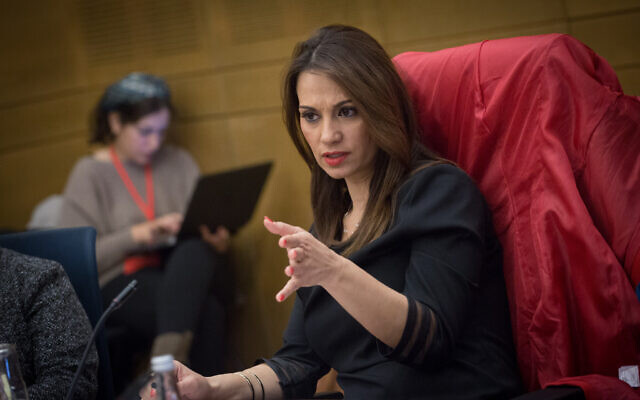Yifat Shasha-Biton also says her faction will not partner with Joint List, calls on Netanyahu to step down

The No. 2 lawmaker in the right-wing New Hope party, Yifat Shasha-Biton, said Thursday that several of Prime Minister Benjamin Netanyahu’s associates have tried to convince her to leave her party and join the premier’s Likud faction.
With all votes counted after Tuesday’s election, results showed both Netanyahu and his opponents unable to form a parliamentary majority, heralding further political gridlock and a potential fifth election. This week’s vote was the fourth in two years.
To break the stalemate, Netanyahu is expected to search for potential “defectors” in parties opposed to him, convince them to jump ship, join forces with Likud, and get his bloc to a majority of 61-seats in the 120-seat Knesset.
Gideon Sa’ar’s New Hope is ideologically close to Likud and stocked with former Likud lawmakers, including Shasha-Biton and Sa’ar, who split from the premier’s party last year.
“It’s no secret that there is very intense pressure for us to join a government led by Likud, including for myself personally,” Shasha-Biton told Channel 12. “I have received official communications, as have other members of New Hope, but it’s not going to happen.”

“They offered me the Education Ministry and in general offered the world to all of our party members, but it won’t happen, so give up on the phone calls,” she said. “We’re a very cohesive group behind Gideon Sa’ar and said explicitly that we will not sit in a Netanyahu coalition. There will be absolutely no defections.”
Yoaz Hendel, another lawmaker in New Hope, hinted at a similar effort to entice him to join Likud.
“To everyone contacting me — a text message campaign in the middle of Passover cleaning isn’t going to make any difference,” Hendel wrote on Twitter, referring to a tradition ahead of the upcoming holiday. “Now, with the true election results, there is only the possibility of a change in government. Give up on the phones and go clean.”
Sa’ar is a harsh critic of Netanyahu who has repeatedly vowed not to join a coalition led by Netanyahu. New Hope won a disappointing 6 seats in the election after once polling at over 20.
MK Bezalel Smotrich, head of the far-right Religious Zionism party, on Thursday called on Sa’ar and the Yamina party’s Naftali Bennett to join Netanyahu’s bloc and “put personal matters aside and enter a right-wing government.”
Netanyahu’s bloc of supporting parties is set to win 52 seats in the Knesset, leaving it short of a majority, even with the 7 seats of the Yamina party, which has not committed to either bloc. If Netanyahu could bring over two lawmakers from the other side of the aisle, he could secure a majority.

The premier also reportedly formed a team that will search for potential mistakes and problems with votes for the Joint List, seeking to annul some 2,600 votes to win a seat for Likud at the Arab party’s expense and shift the Knesset balance slightly in his favor. If the effort was successful, Netanyahu would only need to find one defector to secure a majority.
Shasha-Biton rose to prominence in the past year as the chair of the Knesset’s Coronavirus Committee, where she earned popular acclaim for overturning and criticizing a number of the government’s coronavirus restrictions. Her decision to buck the prime minister also raised hackles among Netanyahu and his allies, who later stripped the committee of its power to overturn government rules.
Shasha-Biton and Netanyahu have traded barbs in the past.
Days before the election, Shasha-Biton said Netanyahu “lies without blinking” and warned he was “setting Israel on the path to one-man rule.”
Netanyahu “does what he wants, plays with peoples lives, their livelihoods, their health, our children’s education. Everything with him is derived from personal and cynical considerations and it is in our power to stop it,” she said.
Earlier this month, Netanyahu was accused of sexism and racism toward Shasha-Biton after he referred to her with a disparaging nickname that appeared to mock her Sephardic roots, while appearing to suggest she was to blame for Israel’s coronavirus deaths.
Also during the Thursday Channel 12 interview, Shasha-Biton said New Hope will not rely on the Arab-majority Joint List alliance to form an anti-Netanyahu governing coalition. The announcement further complicates efforts by the bloc to muster a majority government.

The anti-Netanyahu bloc of parties is set to secure 57 seats in the Knesset, including the Joint List’s 6 seats. An anti-Netanyahu coalition would require the participation of the Joint List, even if Yamina joined. Without Yamina, the bloc would need both the Joint List and the Islamist Ra’am party.
Ra’am, which has not committed to either bloc, has emerged as a major player following Tuesday’s vote, while the larger Joint List has been considered a part of the anti-Netanyahu camp. After the previous election, in March 2020, the Joint List recommended Netanyahu’s opponent Benny Gantz for prime minister. Ra’am split from the Joint List earlier this year.
Ra’am, with 4 seats, could potentially put either side over the 61-seat mark for a majority, but right-wing politicians — both in the pro-Netanyahu bloc and the anti-Netanyahu camp — have ruled out basing a coalition on the party’s support, due to what they say is its anti-Zionist stance.
Netanyahu has repeatedly ruled out sitting with Abbas in a coalition, saying that Ra’am was no different from the Arab-majority Joint List alliance — long considered a political pariah due to some of its members non-Zionist and anti-Zionist views. Wednesday reports said Netanyahu was considering the move, however, and that Likud had made overtures to Abbas.
Netanyahu’s right-wing allies and Abbas have both said they will not be part of the same coalition.
Shasha-Biton in her interview called on Netanyahu to step down following his fourth failed attempt to muster a majority coalition.
“You didn’t succeed four times. It’s ok, step aside, and we will succeed in forming a government without you,” she said.
Her call echoed a statement issued by Sa’ar earlier Thursday.
“It is clear that Netanyahu doesn’t have a majority for a coalition headed by him,” he said in a statement. “Now we must work to fulfill the potential for forming a government of change. As I announced on election night, ego won’t be a factor.”
As reported by The Times of Israel
